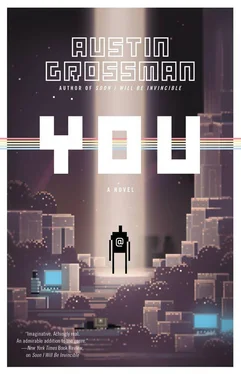There was something else left in the envelope. I tipped it out, a glossy brochure whose cover showed a photograph of a lake ringed with pine trees, a boy in his late teens just in the act of diving from a dock while a lifeguard or instructor looked on, smiling. Underneath it were the words KIDBITS: A CAMPING AND COMPUTER EXPERIENCE FOR TEENS 13–17. SUMMER 1983. LANESBOROUGH, MA.
PART III

THE SECOND AGE OF THE WORLD
The cafeteria was thick with tension and nerd sweat. The walls were hung with long streamers of printout—code samples, ASCII art, player rankings, daily schedules, tournament rules—in the gray, uniform characters of the camp’s two dot matrix printers. It was just after midnight, the last Saturday in August, the last night of computer camp, and the Realms II tournament was down to its last two players. It had been a long summer.
A small contingent of light infantry, literally just eight units, charged Darren’s shield wall, maintained by ogre irregulars with dark-elven support, all with the Discipline upgrade. Nothing short of heavy cavalry should even have distracted the line, and Darren wrote it off as a tactical oversight. Three turns later he looked again and saw the break in the shield wall. The whole flank was collapsing. And the small band of fighters was still on the move, eating up elite guard units right and left. It was the arrival of Mournblade, the Sword that Ruined Computer Camp; it was the end of summertime.
Summer arrived early, the rainy, overheated summer of 1983, the summer that changed things. The movie WarGames came out in June and we went to see it four times in the first week. Simon was entranced; I think it was the first time in his life he saw a smart person who kicked real-world ass.
For another, Darren found the brochure from KidBits in a pile of magazines and mimeographed handouts in a classroom drawer when he was looking maybe for a scrap of paper with an admin password, as Matthew Broderick would have done, or evidence of Mr. Kovacs’s drug habit.
Darren pitched it to us during one of those aimless car rides, the key point being that each of our parents would contribute a little to help pay Simon’s way. Even if no one talked about it, it was clear Simon had fewer options than the rest of us. There was no hope of getting a computer of his own; even if he could afford one, his mother wouldn’t allow it. She’d seen his grades drop, and she worried about him. No computers in the house, no computers anywhere.
The brochure from KidBits cannily anticipated this line of thinking and promised a “balance of computer activity and outdoor recreation.” We’d meet people our own age, get out of the house. The brochure promised five hours of classes a day, sports, hiking, and “a fun and instructional atmosphere.”
What clinched it was a letter from UMass Amherst that came almost the next day. Whatever had happened to Simon’s grades, he could still destroy a standardized test when he wanted to, and UMass decided to overlook his record and treat him as a diamond in the rough. Simon had applied early and been offered a full scholarship. From what I understood it was the only way he was going to college at all.
Even then, I thought there was a little more to the summer-camp plan. For one thing, on the last day of school I saw Simon by himself in the computer lab. The air-conditioning had shut off for some reason and school was stifling hot. He was typing, banging the keys on one of those huge old single-piece terminals. The printer started up, an old chattering dot matrix that took in a single long stream of paper, perforated on either side for the blunt teeth of the plastic gears that would catch it and pull it through. The printer head jolted back and forth and the machine rocked with the effort of churning out 148 pages of source code for Realms of Gold I: Tomb of Destiny .
Simon fit the entire slab into a three-ring binder—the largest kind, with rings that could have fit around his upper arm. He snapped them shut with the nervous gravity of a man carrying nuclear authorization codes. It was the Codex of the Realms, and it felt weighty and dangerous, less like code and more like the warhead itself.
Darren’s father drove the four of us up to computer camp on the last Monday of June. The station wagon pulled up in front of the Bertuccis’ and Simon came out, waving good-bye to his mother inside and running to the curb. We pulled out and onto I-90 for the long quiet drive west, the road bordered with pine forest and fast-growing high-tech office parks, buildings with shiny black glass and no signage, computer start-ups and defense contractors. Darren’s dad worked at one of those contractors, doing he couldn’t say what sort of work on Cold War initiatives. He was tall, red-faced, an aging athlete who didn’t pretend to understand what the four of us were up to. He made awkward small talk with Simon, asking after his parents, his grades, before falling silent.
It was almost noon by the time we turned off onto a single-lane road that wound for miles with no houses on either side, just pine trees. Mr. Ackerman missed the turn and doubled back to turn in at a dirt road with a pink construction-paper sign stapled to a tree, just KIDBITS in black Sharpie and an arrow. The road gave out at a circular drive before a two-story brick building with slightly dirty white trim. The main building (called Main) was a boarding school most of the year, rented out for the summer.
About forty boys and eighteen girls were collecting in and around the building, each orbited by one or two parents, unglamorous fortysomethings who had an air of competitiveness and also a shared, head-shaking embarrassment. They were the parents of computer geeks without knowing what that meant.
Neither did any one of us, quite. It was a deeply peculiar moment, the teenage geeks of the personal computer era emerging from CRT-lit curtained bedrooms to behold each other for the first time. To see ourselves as a strange, incipiently powerful cohort. And it wasn’t so much the way we looked—there were plenty of soft bodies, T-shirts, and bowl-cut hair, but there were also more than a few would-be tough kids. The girls were alert and conservatively dressed, most of them used to passing unnoticed at the back of the class. A few of them towered over the tinier late-blooming boys. There were angry nerds, frightened nerds, nerds that didn’t know yet they were nerds.
It might have been the eyes; quick eyes, with a way of focusing then looking away. We’d all discovered the same things privately and were meeting for the first time, like a meeting of UFO abductees. Moments of eye contact seemed to have a stealthy tentative question there, something like, “Do you think this is as important as I think it is?” Which at some point changed to “Can you believe they’re really letting us do this?” and “When do you think our parents are going to leave?” It wasn’t the first time in history that nerd was meeting nerd, but it was the first time for us, our cohort—the first nerds of the modem age, floppy-disk drives, game consoles, Apple IIs, and C64s—and we were different.
A cheerful, overweight man sweating in the heat handed out thick orientation packets, a manila folder with a name handwritten on the front. “Welcome to KidBits,” he said. The folder held a medical release form; a personal information sheet to check. A room key, taped to a map of the dorm with a room circled. A map of the area. There were a few stapled pages of orientation information; curfew and lights-out times. We’d be doing swimming lessons and outdoor sports, the camp regimen from time immemorial—hiking, tennis, soccer. And computers.
Читать дальше






![Ally Carter - [Gallagher Girls 01] I'd Tell You I Love You But Then I'd Have to Kill You](/books/262179/ally-carter-gallagher-girls-01-i-d-tell-you-i-lo-thumb.webp)






